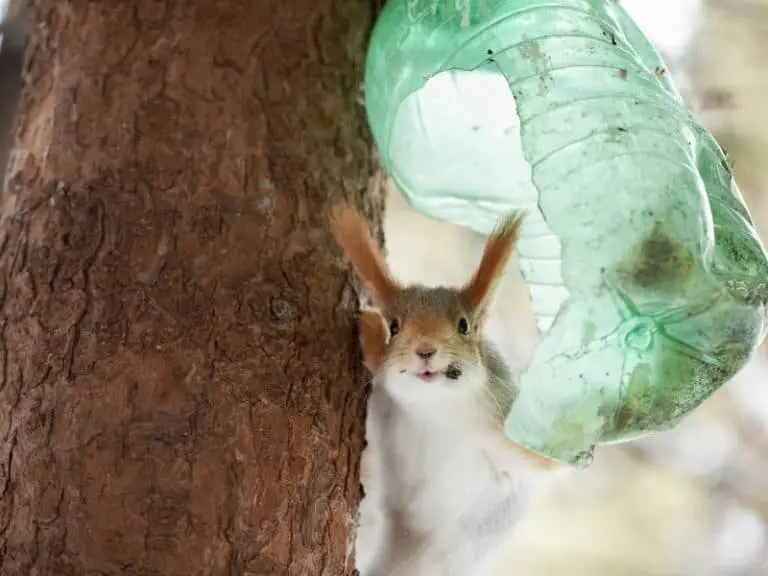Can Squirrels Attack People or Dogs?
Cute squirrels with beady eyes, cute tails, and bright personalities do not seem dangerous, and in fact, they appear charming, although with so many stories and accounts of attacks, is it true that squirrels attack people and dogs?
Squirrels have been documented to attack and bite people and dogs. Attacks are seldom fatal and they usually happen when a squirrel feels cornered. Squirrels can be aggressive when protecting their offsprings. When infected with rabies, roundworms, or other diseases, they may also become hostile.
The motive behind a squirrel attack cannot always be known.
Knowing that squirrels have been known to bite humans and pet dogs, the next logical question to ask is how dangerous they are. Most of the time, squirrels are relatively harmless.
This is why, aside from their cuteness, people are generally not concerned about their presence and even enjoy having them in their immediate surroundings.
Still, there are also certain dangers involved in being around squirrels. They can carry the rabies virus and transmit them, although this is rare.
Let us discuss the details of squirrel behavior and what can be done when they become vicious and suddenly bite you or your dog.
Accounts of Squirrels Turning Aggressive
A normally docile squirrel can suddenly turn aggressive.
People have claimed that squirrels apparently charged at them and even appeared to chase them. These experiences make people naturally wonder if there is something to fear from squirrels.
It is only normal for people to ask if these aggressive squirrels have rabies or some other diseases which cause them to attack people.
People have also reported that when they encounter baby squirrels, these creatures are often unafraid of people, coming right up to them and engaging them. Young squirrels can even climb up the legs of humans.
People are thus beginning to question if these creatures are starting to become more aggressive.
Generally, squirrels are born having no fear of people or almost everything else.
They also become curious and attracted to movements in their environment, especially in times that they are on their own without their nestmates with them.
They are known to climb up pants and cuddle against people’s hands.
Squirrels that seem to be “charging” you or acting aggressively towards you are not trying to attack or scare you. Squirrels are only very comfortable being around humans and usually associate food with people.
This resulted from people always feeding squirrels in parks and other places. In fact, it is possible to train squirrels to take peanuts from your hand in just three days.
Normally, “charging” squirrels almost always stop short of reaching you and attacking.
They also easily get discouraged and run away when you make the smallest threatening move.
The Reason Why Squirrels Bite

Nonetheless, despite their normally docile nature, can squirrel bite you and your dog? Yes. In fact, squirrels are known as the 4th most common wild animal that attacks pets.
And despite their small size, squirrels can still cause considerable injury and damage. This is only reasonable because they have a small size. Thus, carnivorous house pets like dogs and cats can easily think of them as tasty treats to eat.
However, squirrels are quite agile, and they are equipped with small, sharp claws that give dogs and cats significant difficulty in catching and eating them.
According to some veterinarians, squirrels are bound to fight back if a dog or a cat corners them. This is due to the fact that squirrels feel that they have no choice but to fight back, attack, and bite.
One thing that lets squirrels avoid danger from your pet dogs or cats is their group mentality.
They have the ability to use whistling calls that warn their fellow squirrels of danger, helping them avoid encounters with your pets. In general, squirrels are very peaceful animals.
They almost never show hostility to humans or pet dogs. It is a fact that bites from squirrels are very rare. Squirrels get scared easily, and they almost never let humans approach too near.
The sad fact is that most bites from squirrels arise due to reckless behavior on the part of people and dogs.
What Not to Do Around Squirrels
There are two general behaviors that you and your dog should avoid when encountering and dealing with squirrels.
These are the following:
- Feeding them
- Interacting with baby squirrels or offspring.
Do not feed squirrels
The majority of squirrel bites occur on occasions when people try feeding them.
Because of the enticement provided by the free food, the squirrel tends to come closer to the person, much nearer than it would normally approach in normal circumstances.
After all, it is still a wild animal.
One reason where a squirrel can bite a hand or finger is when it mistakenly bites the skin while trying to get the morsel of food that a human is offering it.
Squirrels are relatively short-sighted so that they can misjudge the distance of a hand or the food placed on it.
In addition, while the squirrel is eating from the hand of the human that is feeding it, it may get startled or scared by any sudden sound or movement.
This may trigger its defense mechanism, causing an adrenaline rush and initiating a fight-or-flight response. As a result, the squirrel may inadvertently bite the person because of its fear.
Basically, feeding any species of wildlife such as a squirrel always entails a considerable amount of risk.
After all, wildlife scientists, biologists, and conservationists are always saying that feeding wildlife can cause harm to them and also possibly to people.
It is not advisable to feed wild animals because they get used to humans, and this causes them to become bold and aggressive because they have lost their fear of people.
When the time comes that people seek to catch or kill wild animals for nefarious reasons such as the illegal wildlife trade, these wild creatures may not have the defensive mechanisms they used to have when they still had no contact with humans.
Being close to friendly humans, they easily mistake poachers as also being friendly, and they then get easily victimized by illegal wildlife collectors.
Our nearness to them can thus cause damage to these wild creatures, to people, and to our environment.
Refrain from interacting with young squirrels
It is well known that squirrels and other wildlife, just like most animals, can become extremely defensive of their offspring.
What can be a characteristically friendly and docile animal can suddenly turn into an aggressive and hostile creature that fights tooth-and-nail to protect its young.
Therefore, to be on the safe side, make sure that you never try to hold baby squirrels, approach them, offer them food, or touch them in the least. In short, leave young squirrels alone!
Baby squirrels are known to have no fear of humans, approaching people with abandon and even scurrying up and climbing up people’s legs.
When this occurs, the mother squirrel could naturally become aggressive, and they might end up biting you to send the message to you not to mess with her baby.
Therefore, be careful when there are baby squirrels around. There is no need to be fearful of them or their parents; you just need to remember that squirrels seldom bite and that you should not provoke them.
Squirrels are still wild animals; they should thus be treated as such, giving them a wide berth and giving them a healthy amount of respect.
Are Squirrel Bites Dangerous?
Squirrel teeth, just like other rodents, constantly grow.
Because of this, they need to wear their teeth down on a daily basis by chewing and gnawing. This is why they always have to chew all kinds of materials, including rubber, wood, metal, and plastic.
Their bites and teeth are powerful enough to elicit pain and cause a bloody skin wound. Always remember that healthy and normal squirrels will only bite when they are provoked.
Whatever the reason may be, if squirrels attack or charge you whether it was provoked or not, then you should have your wound examined by a doctor and have yourself medically treated as a possible rabies post-exposure patient.
What to Do When a Squirrel Bites You

Squirrels are very common all over the country, regardless of the area being urban, suburban, or rural.
Wherever you live, you will likely have squirrels near you. These friendly creatures are usually harmless, but there are rare circumstances where they still bite humans.
The first thing to do upon being bitten by a squirrel is to wash the bite area with water and soap thoroughly. It is best to use warm water mixed with the soap and to clean the bite site gently.
Consider having your wound checked by your doctor in an emergency room or hospital.
The best option regarding squirrels is to avoid being bitten by them in the first place.
A squirrel bite is so easy to prevent. There is also a great incentive for you to avoid squirrel bites because they can transmit many diseases to you, including the deadly viral infection rabies.
After a squirrel bite, you should keep in mind that you must never panic. A squirrel bite is usually not serious.
After washing the wound, have it disinfected with hydrogen peroxide, povidone-iodine, or alcohol (which will most probably sting and hurt). Some health professionals have the controversial opinion that such disinfectants make healing slower and are too harsh for human skin.
However, it is always standard practice to disinfect wounds right after cleaning them.
Next, you may bandage the wound or simply use a band-aid if it is only a small puncture.
A more serious bite may require a towel or gauze to cover it. It is important to cover your wound because a covering can facilitate faster healing and prevents the possibility of an infection.
It is best to keep the wound covered until it has fully healed.
Afterward, proceed to a hospital to have it properly examined and treated by a doctor.
There is a very low risk of infection or disease from a squirrel’s bite.
Still, it is always possible, and you can easily be at risk of severe illness, which you cannot detect until it has worsened considerably if you do not consult a doctor.
When bitten by a squirrel, watch for particular warning signs for the next few weeks to see if the bite has transmitted an infectious bacteria or virus to you.
There are signs of infection that you should watch out for. If the signs start appearing, you should immediately seek medical help.
Rabies considerations
When you are bitten by a squirrel, there is a possibility that you contracted rabies from it.
There are certain signs that an animal is rabid. For example, animals that appear weak or foam at the mouth could have rabies.
Unfortunately, the rabies virus does not show symptoms in some infected animals until the disease is in its late stages.
It is therefore very essential that you provide your doctor with the most detailed information as you possibly can about the circumstances of the squirrel bite and attack.
Another important feature of a bite from a rabid animal is that it is usually unprovoked.
Signs of a bacterial or viral infection in people, including rabies, can be headaches and muscle pains, nausea, and fever, among other possible signs.
However, the good news is that squirrels have never been known to have ever transmitted rabies to humans.
Although the possibility exists that a rabid squirrel may bite you and transmit the virus to you, it is very unlikely, and to be bitten by a rabid squirrel is a very unlucky occurrence.
Squirrels are among the few wild animals that do not trigger a hospital rabies protocol when they bite.
This is due to the fact that squirrels are too small so that if a rabid animal bites them, they would most likely die immediately without getting the chance to develop the viral disease and its symptoms.
In addition, because of their very small size, they have a timid nature, so that they usually keep themselves away from other animals, thus severely reducing the chances of a bite from a rabid animal.
Other diseases
A squirrel bite can also transmit other infectious diseases to you. The diseases that you can possibly contract from a squirrel bite include the following:
- Tularemia
- Roundworm brain parasitism
- Typhus
- Ringworm
- Lyme disease
- Encephalitis
Fortunately, these infections are also rare.
If ever you contract a bacterial infection from the bite of a squirrel, it is most likely because it has a bacterial infection in its mouth.
Washing the wound thoroughly is usually enough to prevent such an infection and avoid illness.
If you experience fever; flu-like symptoms; and redness, swelling, and soreness in the bite site, this can be an indication that you contracted an infection.
In this case, it is imperative for you to seek medical attention immediately.
What to Do When a Squirrel Bites Your Dog
It is also possible for your dog to be the victim of a squirrel bite.
In such cases, it is a bit more difficult to determine if it was a provoked or unprovoked bite. This is because many pets, especially dogs, routinely play and have fun by chasing squirrels and tormenting them.
It is important always to ensure that your dog or cat is updated in their vaccination program. Even if rabies transmission is extremely rare in a squirrel bite, it is still possible.
You also need to thoroughly wash the bite wound with water and soap and also disinfect it.
You may opt to take your pet to the veterinarian, although costs may be prohibitive. At the very least, report the bite to your vet. Majority of states mandate that animal bites should be reported.
A squirrel bite can be a painful and scary ordeal for you and your pet, but with proper care, both of you can look forward to recovery with no long-term negative consequences.
Next time, try to exert greater caution whenever you and your pet interact with wild animals like squirrels. It is also possible to train your dog to ignore squirrels.
Sources
Photo credit: ©canva.com/RyanJLane, ©canva.com/mattalberts, ©canva.com/Gerardo_Borbolla
Medical Disclaimer: TheHomePestControl is a digital publisher and does not offer personal health or medical advice. The contents of this website are not intended to substitute for professional medical advice, diagnosis, or treatment.
Affiliate Disclaimer: As an Amazon Associate, I earn from qualifying purchases made on our website. If you make a purchase through links from this website, I may earn a commission at no additional cost to you.






